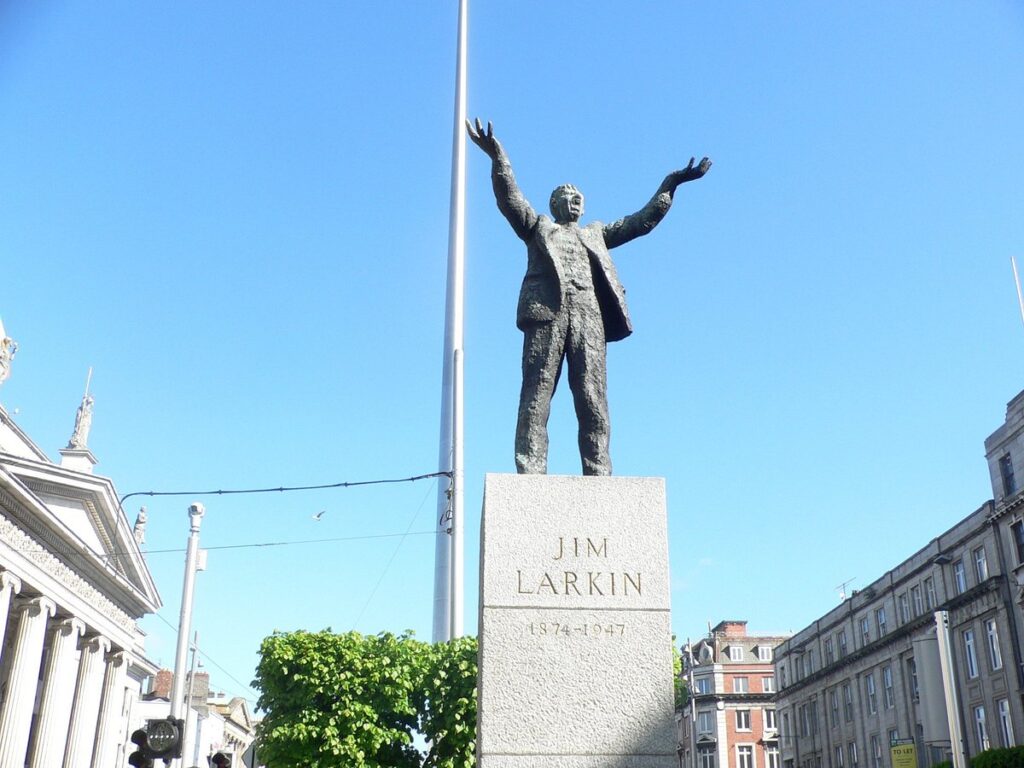Note: If you wish to receive, via e-mail, (1) my weekly newsletter or (2) daily copies of these posts, notify me at [email protected] and indicate which you would like. I promise not to share your e-mail address with anyone. To unsubscribe, send me a follow-up email.
Friday
As a result of our visits to Ireland and North Ireland, I have fallen in love with the poetry of Patrick Kavanagh, who was raised on a farm with minimal education but found his way to poetry in spite of that. I share here a wonderful poem he wrote about labor leader Jim Larkin, who I found honored in both Dublin and Belfast.
In Dublin there is a large monument of Larkin gesticulating in his characteristic fashion, and there is a large poster of him in the North Ireland history exhibit in Belfast’s City Hall. Dublin appears to honor him for his commitment to Irish independence, Belfast for his contributions to the labor movement. His most notable achievement regarding the latter is his leadership of the 1913 Dublin lock-out, which historians sees as the Irish trade union movement coming of age. At stake were wages, working conditions, and the workers’ right to organize.
Larkin was famous for his energy and his eloquence, leading George Bernard Shaw to describe him as “the greatest Irishman since Parnell” (Parnell also has an impressive statue in Dublin). In his poem about Larkin, Kavanagh praises the way that labor leader could inspire workers to see beyond their working conditions to what life could be. When the poet writes that Larkin urged workers to look beyond “the serf’s grey docks” and see “the flowers are growing for you, and wonderful trees,” I am reminded of Karl Marx in his Preface to Hegel: “Criticism has plucked the imaginary flowers on the chain not in order that man shall continue to bear that chain without fantasy or consolation, but so that he shall throw off the chain and pluck the living flower.”
Along the same lines, Kavanagh says Larkin persuaded dock workers to see ships, not as “dark galleys”—which is to say, working conditions that treated men essentially as prisoners—but as potentially “pine forests under the winter’s starry plough.” Similarly, the “brown gantries” that the dock workers operate to load the ships could become, if workers were treated with dignity, “the lifted hand/ Of man the dreamer whom the gods endow.’
Kavanagh may echo Jesus when he imagines Larkin saying to the workers that “the ghost of bread/ Must not haunt all your weary wanderings home.” In other words, people do not live by bread alone. Important though life’s necessities are, they are not all there is to life.
As Kavanagh sees it, the Irish workers before Larkin were seduced away from confronting their real conditions by the sensationalist press and by sports. (He sounds here like Herbert Marcuse and Theodor Adorno, members of the Marxist Frankfurt School, who saw pop culture as the opiate of the masses.) When Larkin “cried the call of Freedom and the call of Pride,” Kavanagh says, Irish workers were “cheered from out the utter degradation of their miseries” and, with the 1913 lock-out, changed labor history.
On the Death of Jim Larkin
By Patrick Kavanagh
Not with public words now can his greatness
Be told to the children, for he was more
Than a labor-agitating orator —
The flashing flaming sword merely bore witness
To the coming of the dawn. ‘Awake and look!
The flowers are growing for you, and wonderful trees,
And beyond are not the serf’s grey docks, but seas —
Excitement out of the creator’s poetry book.When the Full Moon’s in the River the ghost of bread
Must not haunt all your weary wanderings home.
The ships that were dark galleys can become
Pine forests under the winter’s starry plough
And the brown gantries will be the lifted hand
Of man the dreamer whom the gods endow.’And thus I hear Jim Larkin shout above
The crowd who wanted him to turn aside
From Reality coming to free them. Terrified
They hid in the clouds of dope and would not move.
They ate the opium of the murderer’s story
In the Sunday newspapers; they stood to stare
Not at a blackbird, but at a millionaire
Whose horses ran for serfdom’s greater glory.And Tyranny trampled them in Dublin’s gutter,
Until Larkin came along and cried
The call of Freedom and the call of Pride,
And Slavery crept to its hands and knees,
And Nineteen Thirteen cheered from out the utter
Degradation of their miseries.
